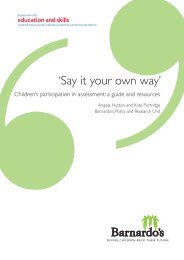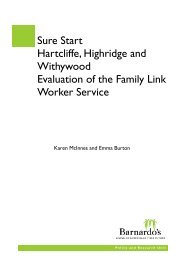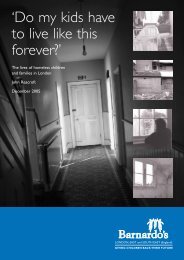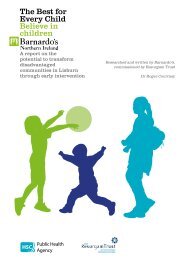Splintered Lives - Barnardo's
Splintered Lives - Barnardo's
Splintered Lives - Barnardo's
Create successful ePaper yourself
Turn your PDF publications into a flip-book with our unique Google optimized e-Paper software.
PAGE 78<br />
chapter<br />
13 One important factor that Finkelhor et al's (1988) work highlights is that 64% of the day<br />
care abuse cases involved media coverage, and for half of them it was extensive. Cases<br />
involving multiple perpetrators also increased the likelihood of a strongly mobilised<br />
defence. In a number of these cases, where parents were not the abusers, they<br />
mobilised in support of their children and there were considerable imparts on the local<br />
community. These actions all affected the investigation and subsequent legal<br />
proceedings, enabling defence lawyers to argue that children's testimony had been<br />
contaminated. This also makes these cases different and requires different skills and<br />
responses to those we have developed so far. For example, child protection agencies<br />
need to have a press strategy; staying silent helps neither agency staff nor children.<br />
Some organisations have attempted to develop screening mechanisms for 'paedophile'<br />
job applicants (see, for example, McCormack and Selvaggio, 1989). Many take the form<br />
of 'personality tests'. These are blunt instruments which skilled abusers would have little<br />
difficulty circumventing, whereas naive applicants who have not abused children might<br />
be caught by. One we have seen, for example, includes as some of its elements having a<br />
history of sexual abuse, having little social contact as a teenager, and a preference for<br />
working with children with a history of abuse. Many adult survivors of sexual abuse<br />
would check off all three, and it may therefore penalise those who are using their past as<br />
a resource for understanding and support of others in the present. If screening protocols<br />
are to be developed they need to be done in such a way that they guard against the<br />
dangers outlined above.<br />
In preference to that approach we would recommend developing an ethos within<br />
organisations which communicates to employees, carers and children that an<br />
awareness of the potential for abuse exists. Alongside this structures should be in place<br />
for investigation of allegations and suspicions. Where a case is founded it is grounds for<br />
dismissal/removal and cases will always be reported. What the last few years have<br />
taught us is that where agencies make clear they are serious about listening to<br />
children/survivors, that adults will not be protected where they have abused trust, some<br />
children will come forward. This is one of the ways in which we will create contexts in<br />
which there is zero tolerance of abuse.
















